The Boston Society of Film Critics will be updating their site “live” as the various awards are debated and voted upon. I don’t know precisely when the voting will begin but the site says everything will be decided by 6 pm. 12:56 pm update: “Watch the site over the next four hours,” I’ve just been told.
wired
New weekend “Compass” estimate
Forget yesterday’s $27 million projection for The Golden Compass — now the weekend projection is down to $25 million and change due to a weak 16% Saturday uptick. To what extent, if any, was the Catholic League’s urging that Catholic families avoid this film a wipeout factor? To what extent was it ineffective marketing? To what extent was it the Nicole Kidman/zero sympatico factor? To what extent was it due to audiences being sick of the same old oatmeal? As Jim Verniere‘s 12.7 Boston Herald review began, “”Ready for ‘Harriet Potter and the Chronicles of the Lord of the Golden Compass’?”
“Walk Hard” clip, mini-review
Jake Kasdan and Judd Apatow‘s Walk Hard (Sony, 12.21) is my kind of genre spoof — dry, smart, referenced. I chuckled here and there but mostly I smiled at it, and that’s not a bad thing. I absolutely love that this film doesn’t pander or wallow. It’s not trying to make eight year-olds or the ding-dongs who loved Are We Done Yet? roll in the aisles. It’s into the old-time spirit and attitude of SCTV.
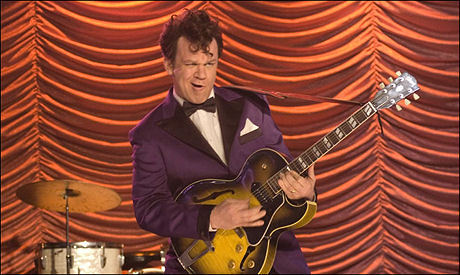
John C. Reilly in Walk Hard
Here’s that clip from the first ten minutes of the film.
Truth be told, Walk Hard is one of those comedies that plays a tiny bit funnier when you’re thinking about it the next day than when you’re sitting there in the seat. You know it’s a clever, high-end thing, but at the same time you’re not exactly howling. I’m not much of a laugher at anything, but I love comedies aimed at people who’ve graduated from high school with at least a B-minus average. Either you’re on the wavelength or you’re not.
The only question I have about the box-office is whether star John C. Reilly has the magnetism to bring in the big crowds.
Nobody would ever mistake Nikki Finke for a cineaste, but she was wrong when she wrote yesterday that Walk Hard “spoofs just about every music biopic ever made.” It mainly spoofs one movie — Walk The Line — with some Ray gags sprinkled in.
“Atoement” doe-or-die
Before the voting late this afternoon among the Boston and Los Angeles film critics, it needs to be recognized that the resulting announcements (combined with tomorrow afternoon’s calls from the New York Film Critics Circle) are very nearly do-or-die verdicts for Joe Wright‘s Atonement.
It became apparent to me on Friday that this very well-crafted romantic tragedy (which I personally like and admire) is on the ropes, in part due to four significant dings. And to compete or least stand abreast with No Country for Old Men, Atonement will have to nab at least one Best Picture trophy today or tomorrow. If it succeeds, fine…off to the races. But if it gets shut out, it’ll be uh-oh time.
Of course, Atonement can still win the Best Picture Oscar if the L.A., Boston and New York critics shine it on. Academy voters can be myopic when so inclined and will vote by their own standards and prejudices, but a Best Picture contender has to have at least a little cultural fortification — tangible, verifiable support from outside-the-industry knowledgables — and without the imprimatur of having been named Best Picture by the big critics groups it’ll be hard (not impossible but certainly difficult) for Atonement to sustain cred and momentum from mid-December to mid-January.
That’s why I wrote on Friday that the Best Picture situation “may well be decided” by Monday afternoon. To repeat: “I’m not saying that the Atonement shortfall (if and when it happens on Sunday and Monday) will decide things absolutely — obviously it won’t — but it will nonetheless cast a certain light and define the situation in a way that will make the pro-Atonement argument a little harder to sell.”
Experience vs. forward vision
“Experience, like nastiness, may also prove a dead end in the year ahead. In 1960, the experience card was played by all comers against the young upstart senator from Massachusetts. In Iowa, L.B.J. went so far as to tell voters that they should vote for ‘a man with a little gray in his hair.’ But experience, Kennedy would memorably counter, ‘is like taillights on a boat which illuminate where we have been when we should be focusing on where we should be going.'” — from Frank Rich‘s 12.0.07 N.Y. Times column.
“What’s it to ya?”
Listen to this HE-edited version of a famous scene from John Ford‘s The Grapes of Wrath. A dirt-poor oakie comes into a diner looking to buy a loaf of bread but he can’t afford to pay more than a dime. Listen to the rest and you’ll be able to follow. The way I’ve cut it, the scene ends where it should — with a truck driver saying “what’s it to ya?”

But listen now to Ford’s version of the scene — the way it actually plays in the film. Ford keeps the camera rolling until the waitress considers the extra-large tip, goes all mushy and says “truck drivers!” Due respect to Ford, but this is my problem with the guy — he’s too sentimental. If Howard Hawks had directed this scene, he would have used the first version.
“Compass,” Kidman run into it
To hear it from Fantasy Moguls’ Steve Mason, the projected weekend gross of The Golden Compass is “anemic” — worse than disappointing — with an estimated $9 million earned yesterday and a mere $27 million for the weekend. Those are shattering numbers for a movie that cost a reported $200 million. By comparison, The Chronicles of Narnia made $65.5 million on its opening weekend in December 2005. Obviously no joy in Mudville (i.e., the New Line offices) this weekend.
Mason is also asking if this latest torpedo-in-the-hull spells the end of Nicole Kidman‘s run as a top-dollar actress. Compass, Mason notes, is Kidman’s sixth wipeout or short-faller in a row (if you don’t count the moderately passable business being done by Margot at the Wedding). Birth, The Interpreter, Bewitched, Fur: An Imaginary Portrait of Diane Arbus and Invasion were all flubs or disappointments.
I’ve been saying this for a long while now. Kidman is a talented actress with mostly excellent taste in projects, but she doesn’t radiate much warmth or empathy and she doesn’t put butts in seats. But she’s had a good run and has a long future ahead of her…just on a lower pay scale. There’s nothing wrong with being Meg Ryan.
Sight & Sound’s Best 2007 Films
47 elite critics have selected their five best films of ’07 for the latest edition of Sight & Sound, and of these Cristian Mungiu‘s 4 Months, 3 Weeks and 2 Days is the top of the heap. Among the runners-up: David Lynch‘s Inland Empire, David Fincher‘s Zodiac, Todd Haynes‘ I’m Not There, Carlos Reygadas‘ Silent Light, Andrew Dominik‘s The Assassination of Jesse James by the Coward Robert Ford, Joel and Ethan Coen‘s No Country for Old Men and David Cronenberg‘s Eastern Promises.
Ritz is now The Taj
Boston is subject to changing investments and ownerships like any big town. It nonetheless came as a shock the other day when I walked by the former Ritz Carlton — the Plaza Hotel of Boston, operating since the mid 1920s — and found that it’s been transformed with a name and a design scheme that’s right out of Las Vegas or Cancun.
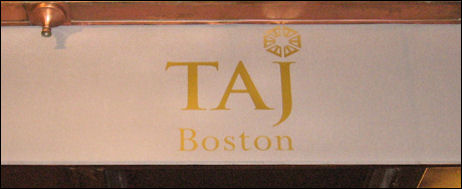
The Ritz Carlton changed hands late last year and is now called The Taj. Millenium Partners, which bought the old Ritz Carlton in ’99, sold it in November ’06 to Taj Hotels Resorts and Palaces, a swanky hotel chain based in Mumbai, India. I’m sorry, but Boston is a conservative, Anglo-Saxon, tradition-bound city, and it’s just icky for an old hotel that’s been around for 80 years to have a name that sounds like a Glitter Gulch casino.
Imagine what Mumbai residents would think if a local hotel was re-christened as the Ritz Carlton. It would be seen as an Anglo-Saxon incursion into the Indian economy, or as a metaphorical reminder of British-Anglo colonization of India. It would certainly not be welcome. If a British or American-owned company were to buy a Mumbai hotel, the smart thing would be to give it a name that doesn’t stand apart from (i.e., in contrast to) the local culture.
Likewise, buying an old-school Boston hotel that overlooks the Public Gardens and re-naming it The Taj is the cultural equivalent of pouring gravy on a tablecloth. It’s a metaphor for a changing multicultural economy and the diminishment of the Boston that used to be, obviously, but it’s really about an Indian company wedging its way into a remnant of an old WASP town and saying, “We’re here, we’re from Mumbai and we don’t give a toss for your blue-blood traditions…get used to it.”
“Atonement” review
I saw Joe Wright‘s Atonement for a second time yesterday, and in view of this and yesterday’s nationwide opening I thought I’d re-run most of my 9.12.07 Toronto Film Festival review with two or three modifications:
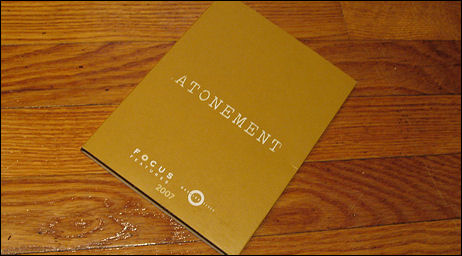
Atonement may not finally be the deepest or most resonant film of the year, but it’s still a shatteringly well-made, rich-aroma romance that will go all the way with (almost all) critics, Academy voters and public alike.
Wright has totally pole-vaulted himself past the level of Pride and Prejudice (a well-made Jane Austen-er that I was only okay with) and taken costars Keira Knightley, James McAvoy and especially Vanessa Redgrave (a likely Best Supporting Actress contender) right along with him.
You can add Focus Features and everyone else associated with Atonement (young Irish actress Saoirse Ronanas, cinematographer Seamus McGarvey, production designers Jacqueline Durran and Sarah Greenwood) as well. Everybody wins with this film, the audience first and foremost.
This is one of those bulls-eye period dramas that feels wonderfully sharp and literate and authentic with emotional tone-perfect performances, and yet the profundity of the payoff is in the way it combines cinematography, editing and sound effects (not to mention one of the most enjoyably splendid uncut Steadicam shots in cinema history — a sweeping beach of Dunkirk shot that goes on for several minutes, deserving applause in and of itself) to create a sort of maelstrom effect.
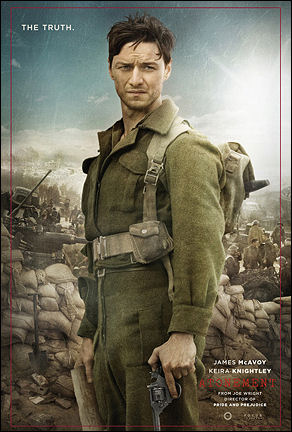
Why, then, don’t I have it ranked higher on my personal best-of-2007 list? Because I’m not sure that Atonement isn’t finally about a young director’s grand effort at trying to knock everyone’s socks off. Wright is resourceful and talented enough to make it play splendidly, but I wasn’t fully convinced that he was truly immersed in the best parts of the ’01 Ian McEwan novel the film is based on.
Boiled down, Atonement is about a British woman writer crushed by guilt over a harmful thing she did as a youth, which was caused by foolishness amplified by sexual panic. And yet the film leaves you with a sense of great regret and sadness. A struck and haunted after-effect that leaves you with something deeper and fuller than what may be suggested by a casual reading of the plotline.
Atonement taps into feelings of regret about all things, about how fleeting and hurtful and unfair life can be when the cards go the wrong way.
It feels wrong to describe Atonement as a film with three acts, although it is that, because it doesn’t feel defined by “acts” as much as the way Wright has cut it all together. It replays or refrains certain scenes and does flash-forwards and flashbacks with impugnity, and never once does it feel gimmicky for doing so. It all fits together and hums like Swiss machinery.
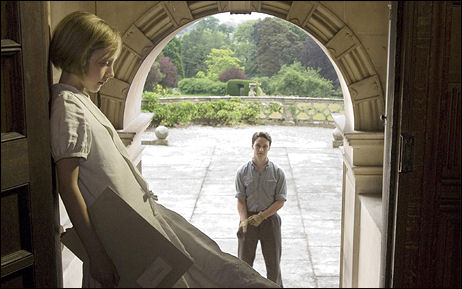
Unless I’m crazy it will almost certainly end up as one of the five Best Picture nominees. And hail to the great Vanessa Redgrave once again. She’s on-screen at the very end for maybe six or seven minutes (perhaps a touch more), and does nothing except talk to an off-screen interviewer, but she hits an absolute grand slam.
Ten Best of 2007
It took me days and days to figure Hollywood Elsewhere’s final choices for the 10 Best Films of 2007 in order of personal respect and preference. I knew it had to be Zodiac on top followed by No Country for Old Men, Control, Sweeney Todd and Before The Devil Knows You’re Dead, but after these it was very tough deciding the order.
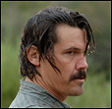

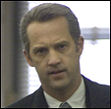

Why is one deeply intoxicating, richly aromatic and well-crafted film regarded in a slightly better light than another? The final criteria had to do with big reach and rewatchability. The top ten, certainly, have a clear and strong vision or theme that you can process and re-process, and I’ve seen each one at least three or four times. It’s a safe bet that they’ll grab and hold onto DVD watchers in 2020 or 2050.
The other seven (#11 through #17) are also thematically strong, in some cases spirit-lifting, and extremely watchable. But with the exception of Once and American Gangster I’ve only seen the other four once, and that, to me, says something.
1. Zodiac (Paramount, dir: David Fincher, prods: Brad Fischer, Mike Medavoy, James Vanderbilt); 2. No Country for Old Men (Miramax, dirs: Joel and Ethan Coen, producer: Scott Rudin). 3. Control (Weinstein Co., dir: Anton Corbiijn); 4. Sweeney Todd: The Demon Barber of Fleet Street (Dreamamount, dir: Tim Burton, prod: Richard Zanuck); 5. Before The Devil Knows You’re Dead (ThinkFilm, dir: Sidney Lumet); 6. Four Months, Three Weeks & 2 Days (IFC, dir: Cristian Miungiu; 7. Things We Lost in the Fire (Dreamamount, dir: Susanne Bier, prod: Sam Mendes); 8. There Will Be Blood (Paramount Vantage, dir: Paul Thomas Anderson); 9. I’m Not There (Weinstein Co., dir: Todd Haynes);and 10. The Bourne Ultimatum (Universal, dir: Paul Greengrass).
HONORABLE MENTIONS: 11. In The Valley of Elah (Warner Independent, dir: Paul Haggis); 12. American Gangster (Universal, dir: Ridley Scott); 13. Once (Fox Searchlight, dir: John Carney); 14. Atonement (Focus Features, dir: Joe Wright); 15. Into The Wild (Paramount Vantage, dir: Sean Penn); 16. The Assassination of Jesse James by the Coward Robert Ford (Warner Bros., dir: Andrew Dominik); and 17. Breach (Universal, dir: Billy Ray).
A logical WGA concern
“No one hires crisis management firms at such huge expense if they’re planning on making a fair deal. A fair deal doesn’t require hundreds of thousands of dollars of spin to sell. A fair deal is its own good PR.” — United Hollywood‘s Laeta Kalogridis commenting on the producers’ decision to hire hardball spinmeisters Fabiani and Lehane, known in political circles as “the Masters of Disaster.”

